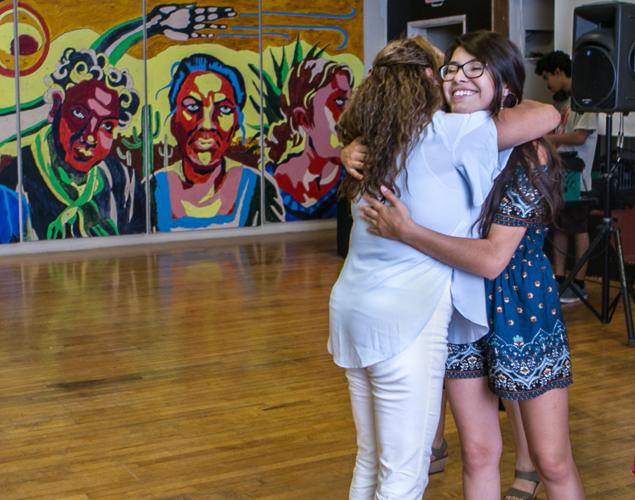Perla Barraza clearly knows sheтs fortunate.
Sheтs lived in УлшжжБВЅ nearly her whole life but without legal authorization. But that hasnтt stopped her from graduating from high school or taking classes at Pima Community College or performing on stage with the grass-roots Borderlands Theater or being an active member of the community or being a mother, sister and daughter.
And sheтs been able to work, as well. She has DACA status т Deferred Action for Childhood Arrivals т which gave her temporary legal permission to work and protection from deportation, made possible under former President Barack Obama in 2012.
While she has been able to accomplish much in her 25 years, her goal of attending a state university has eluded her. The tuition is out of her reach. Even if she were able to pay in-state tuition.
People are also reading…
But a state appeals court last month ruled that Barraza and others like her must pay out-of-state tuition, which is more than double what residents pay to attend the stateтs universities and colleges. Although the УлшжжБВЅ Board of Regents voted Friday to maintain in-state tuition for тdreamers,т young people who were brought to this country illegally by their parents, the issue will move on to the state Supreme Court.
But even paying in-state tuition for DACA students is a burden because state law prohibits them from receiving any form of state financial aid.
Barraza, however, will be able to avoid this legal quandary by attending college outside of УлшжжБВЅ. Sheтs headed to Mills College, a small private liberal arts school in Oakland, California. Sheтll be on scholarship but will need money for living and other incidental expenses.
Last week, relatives and friends of Barraza attended a dinner at the Global Justice Center in South УлшжжБВЅ to raise money to send her and her daughter off to Oakland. While she is deeply grateful for the scholarship, she laments that resources for DACA students to attend college in УлшжжБВЅ are few and the barriers to do so are great.
тItтs kind of upsetting,т she said. тThe state doesnтt want me, the schools donтt want me. Not just me but people in my community as well, regardless of their legal status,т she said.
Mills College will pay for 80 percent of her tuition and the remainder will be paid by additional scholarships and help from friends. She intends to study theater and ethnic studies.
As it turns out the expensive school is the cheaper alternative to attending college in her home state. тIt says a lot about the private college,т she said. тIt believes in dreamers and immigrants.т
Despite their DACA status, dreamers believe nothing much has changed for them. Their family members remain in fear of being discovered and deported. And DACA doesnтt protect them from invasive questions posed by law enforcement agents.
Francisco Salcido, who is undocumented and has DACA protections, said his legal status does not shield him from unfair and intimidating treatment.
тIтm still one of the тbad immigrants,тт Salcido said sarcastically.
Salcido, who works at Baboquivari High School in Sells on the Tohono Oтodham Nation, said that all too often he is stopped and vigorously interrogated at the Border Patrol checkpoint on УлшжжБВЅ 86, despite his protest that he has DACA status.
He said agents have surrounded his vehicle. He is asked questions. He is viewed suspiciously, he said. He is sent to secondary inspection. Agents do not wave him through as they do with cars filled with sun-toasted tourists returning from a weekend trip to Puerto PeУБasco.
There has been one noticeable change at the Border Patrol checkpoints: The pressure has ramped up since the election of President Trump, he said.
Like his friend Barraza, Salcido hopes to attend a four-year college. After graduating from Sunnyside High School, Salcido enrolled at Pima Community College on a full scholarship. But after one semester the scholarship was taken away because he is undocumented. Subsequently he re-enrolled, but family hardships forced him to withdraw. Heтs the only one in his family who can legally work.
Salcido is happy for Barraza. So should we all be if we are intent on making better lives for others and for ourselves. Barraza and all the other thousands of dreamers are working toward achieving opportunities for themselves and their families. They benefit. We benefit.
This shouldnтt have to be a dream.
Ernesto Portillo Jr. is editor of La Estrella de Tucsón. He can be reached at 573-4187 or netopjr@tucson.com. On Twitter: @netopjr


















